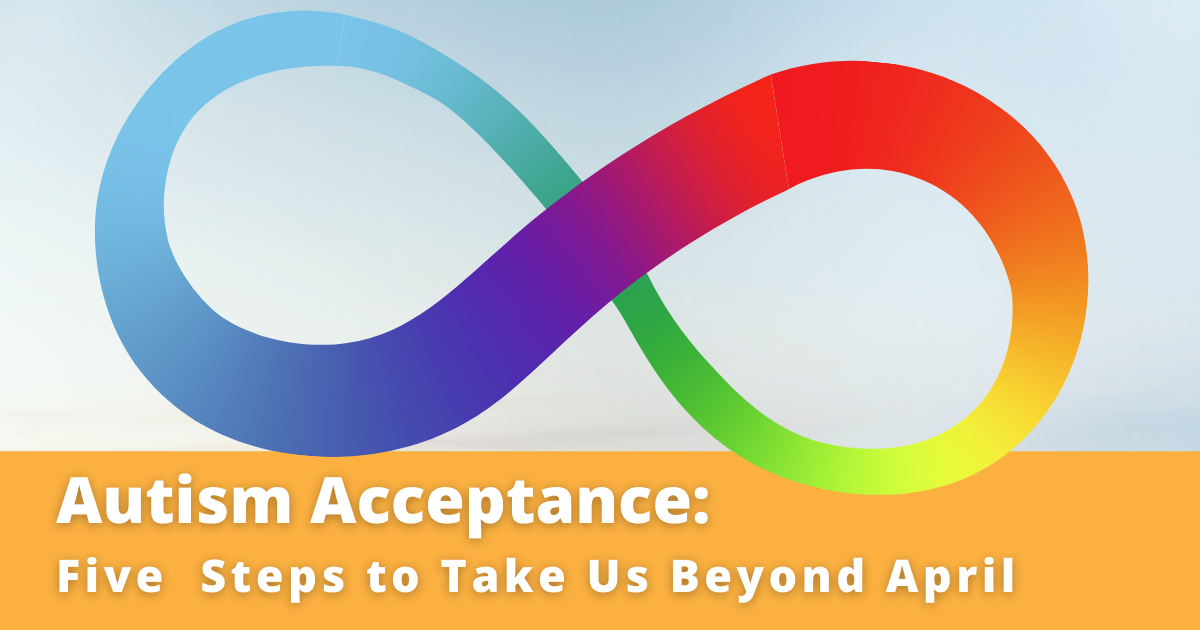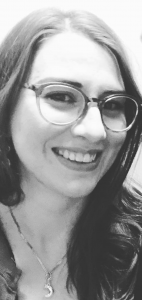Autism Acceptance: Five Steps to Take Us Beyond April

“Do the best you can until you know better. Then when you know better, do better.” -Maya Angelou
It’s official. Wisconsin shifted language from “Autism Awareness Month” to “Autism Acceptance Month” this April. Now, it’s time for our actions to reflect our change of language. As we reflect on the past month, I wanted to share some of the lessons I’ve learned on my journey towards better. I also share an invitation to continue on the autism acceptance journey all year round, with five steps to start:
1) ACCEPT that Awareness Isn't Enough
Awareness says “I see you.” I see others like you. I see your label. On a good day, it says “I see your differences.” On a really good day, Awareness says “I see that society was not designed to support you.” But that’s not enough. It’s not changing our mental model of autism. It’s not rethinking our support. It’s not creating a community of inclusion and belonging. It’s not healing the mental & emotional burdens of being viewed as problematic or wrong. Not. Enough.
2) ACCEPT the mistakes of our past
In 2016, I attended TASH in St. Louis. In a session related to communication, I was moved by a mother’s know-better-do-better story. Her child, like so many others born in past generations, was diagnosed by a doctor who suggested they institutionalize. The mother shared a long list of things they have believed about their child before they knew better. “We accepted that because he didn’t speak, he didn’t have a lot to say.” Now, these parents are members of CommunicationFirst, advocating for access, opportunity, and justice, because “Communication as a human right.”
Admitting that we have been wrong is our first step. It’s emotional. We have to forgive ourselves for what we didn’t know, and hold ourselves accountable to changing our approach. Rejecting deficit-thinking and presuming competence is our key to rebuilding our mental model of autism. First, as individuals. Then, as a society. Read on!
3) ACCEPT the Social Model of Disability
For decades, our understanding of autism has been based on the medical model of disability. Autistic researcher and advocate Dr. Jac Den Houting (2019) explains this problematic history and the necessary neurodiversity shift to the social model of disability in their TEDx Talk, “Why everything you know about autism is wrong.”
“Most people understand autism through medical assumptions. They understand autism as a medical condition. A disorder. Even as a tragedy. In the medical paradigm, we’re taught to believe that there’s a correct way to develop neurologically, that there’s a right way for our brains to work; the ‘normal’ way, and that any other way of developing is wrong. And need to be treated. And fixed” (Den Houting, 2019).
Our understanding….research…funding and related services and supports have been deeply entrenched in deficit-based assumptions which lead to deficit-based outcomes.
“About 60% of autistic adults are under-or-unemployed. 87% of us have mental illness. Autistic people are 9x more likely than the general population to die by suicide. We have an average life expectancy of just 54 years. And we deserve better” (Den Houting, 2019).
The neurodiversity paradigm and the social model of disability is a welcomed shift in our mental model of disability. In order to design accessible and inclusive communities, we must rid ourselves of the ableist notion of “right,” and “wrong.” We must not only accept, but also support differences….well, differently.
“In the social model, disability happens when a person’s environment doesn’t cater for their individual characteristics. In the social model, we don’t…we don’t refer to people with a disability. Disability isn’t something I carry around like luggage. Instead. We use disability as a verb. Disability is something being done to me. I’m actively being dis-abled by the society around me” (Den Houting, 2019).
4) ACCEPT and listen to the expert voices of the autistic community.
There’s nothing that makes me more uncomfortable than being introduced as an autism expert. If I have become an expert in anything, it has been consuming information presented by the #actuallyautistic community, comparing it to the information presented to me as an educator, and talking about it within my spheres of influence as an advocate for social justice. From identity-first language to neurodiversity, autistic advocates have been telling us and showing us what we’ve needed to hear for ages. It’s 2021, and more and more folks are finally starting to listen.
The Autism Society of Greater Wisconsin recently asked their members why autism acceptance is important to them.
“Many families fear to have their child ‘labeled’. But if society learns to ACCEPT Autistics rather than expect us to hide what makes us ourselves, the next generations of Autistic Youth won’t feel as alone.” -Denielle Everson
“Education about autism is truly an important key to acceptance. I believe most are aware that autism exists, but there is still a lack of knowledge about what it is like to walk in our shoes. When people learn that we are the same as they are and that we just process things differently, it will be very helpful. Knowledge will build acceptance.” -Jesse Horn
“People with autism are just that. People.” -Sean Inderbitzen
As a teacher, I started to experience less stress and more success when I started to let go of what I thought I knew, embraced neurodiversity, and replaced compliance with compassion. Not sure where to start? Read on!
5) ACCEPT Autism as a Culture
Culture is an umbrella term that describes shared beliefs, values, behaviors, and social characteristics of a particular group within society. Autistic advocates around the globe have joined the Neurodiversity Movement in an effort to ensure autistic rights, and to create autistic pride. Autistic scholar and educator, Dr. Nick Walker describes the Neurodiversity Movement as “a social justice movement that seeks civil rights, equality, respect and full societal inclusion for the neurodivergent.”
In Autistic culture, autism is not a diagnosis. It’s a cultural identity; shaped by neurodivergent beliefs, values, behaviors, and social characteristics. In the film, Spectrum: A Story of The Mind, Walker describes how autistic pride has allowed him to reclaim his confidence, saying “I’ve reclaimed my ability to move like an autistic person, and to be an autistic person, and to live as an autistic person needs to live to thrive…and so I’m thriving.”
The messages surrounding autistic identity in many schools, cities, clinics, and homes, are rooted in deficits, sending children the clear messages that their identity…their truest selves…are not only weird, but wrong. These messages, while often sent unintentionally, and sometimes silently, are felt routinely. Messages that say “you do not belong.” Based on culture. Race. Neurotype. Identity. Difference. Equity scholar, consultant, and founder of EdChange and the Equity Literacy Institute, Paul Gorski offers a training on how to ditch the deficit ideology. Gorski cautions, “The most devastating brand of this sort of deficit thinking emerges when we mistake difference – particularly difference from ourselves- for deficit.” Differences perceived as deficits are at the center of ableism and racism, an intersection that must be understood and dismantled to achieve equity in our schools, and social justice in our world.
Just as it’s critical for white folks to redefine racism in order to understand the systems that have been designed to oppress people of color, it is critical for neurotypical folks to examine their understanding of autism and disability in order to advocate for a preferred future where neurodiversity is understood, respected, supported, and connected. To gain a better understanding of autism and autistic culture, seek to learn from the lived experiences of the #actuallyautistic community. Here are a few places to start:
Read
Consider supporting Autistic Authors and the Autism Society of Greater Wisconsin by purchasing a book on Amazon Smile.
Watch
- ASAN: Welcome to the Autistic Community
- Speechless with Carly Fleishmann
- Spectrum: A Story of the Mind
- Wretches and Jabberers
- Intelligent Lives
- Crip Camp
- The Reason I Jump
- Jac den Houting: Everything you Know About Autism is Wrong
- Amy Laurent: Compliance is Not the Goal; Letting Go of Control and Rethinking Support for Autistic Individuals
Visit
Follow
Acceptance is an act. A practice. White Fragility author Robin DiAngelo describes that anti-racist practice is ongoing, offering that “You will never ‘arrive.’ It’s a journey, not a destination.” As we journey towards and beyond autism acceptance, let’s learn from the lived experiences of others. Let’s embrace the neurodiversity paradigm, and join the movement for social justice. Let’s take comfort in knowing that we have the ability to shift our individual perspectives in order to shift our society. Let’s help more people share Jac den Houting’s realization that “I wasn’t a failed neurotypical person. I was a perfectly good autistic person.”
Become a member of the Autism Society of Greater Wisconsin and follow them on social media to continue learning and growing!

Written by Allie Tasche
When Allie’s adventures in parenting pause, she is an educator, advocate, learner, and leader for social justice in Wisconsin. Allie has spent her career as a learning strategist, autism and inclusion coach, and program support teacher in Wisconsin schools. Allie realized her passion for advocacy after creating professional development and classroom sensitivity training in schools. This led to guest lecturing at local universities, and presenting on topics related to Universal Design for Learning, Autism, and Inclusion at disability & education conferences (OCALICON 2018, CAST Symposium 2017) with her thought partner, Katy Hayes. She recently moved to the lakeshore, and joined the Autism Society of Greater Wisconsin’s Board of Directors.
Direct inquiries to atasche@autismgreaterwi.org


